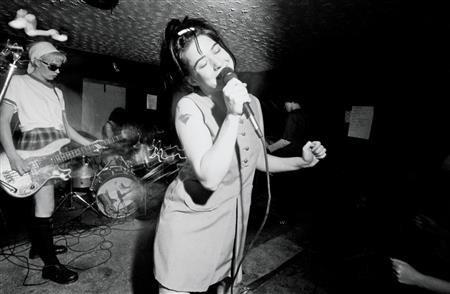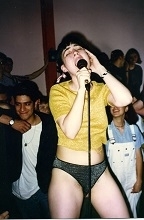 |
| (http://www.newyorker.com/magazine/2012/11/26/hanna ()) |
"You're still going to get criticized, so you might as well do whatever the **** you want." - Kathleen Hanna. These were words spoken by a riot grrrl feminist icon, and they represent a big part of her personality and character. In Olympia, Washington in early October 1990 a group of 4 friends decided they were sick and tired of the male dominated punk rock scene. Lead by Kathleen Hanna; the group rocked their way into music history with songs centered around girl power. She inspired an entire feminist movement, and taught girls to be powerful and stand up for themselves. A hero must possess bravery, because if they weren't brave they would be too scared to get anything done in the world. They must also be powerful. If you aren't powerful then who is going to listen to you? Hanna was most definitely a hero because she was brave enough to be loud and put herself out there, and she was so powerful that it was nearly impossible not to listen to her.
Kathleen Hanna displays bravery by standing against gender roles and sexism; not only in the punk rock scene, but anywhere sexism is present (also known as everywhere). Hanna worked as a rape counselor before starting her first band, and it inspired a lot of her music. "She had been working at SafePlace, a shelter for survivors of domestic violence and sexual abuse in Olympia, Wash., and had begun to feel overwhelmed by the stories she was hearing - and by how hard it was to make anyone outside the community listen to them." (Symonds) Hanna was so brave to be able to listen to all the stories of rape and abuse survivors, and the things they said hit her hard. She realized that no one was listening to them, so she went on to write songs based around their experiences to spread awareness. She got people to actually listen. She talks about how passionate she was about trying to reach young women with her music. Who wouldn't be tired of the white males dominating the punk scene (along with them dominating everything else). "I think we really did have the goal in mind that we wanted to change things, at least in the music scene," Hanna explains. "It was also really selfish .... I wasn't making music at that time for a bunch of white, suburban male teenagers. The lyrics weren't about them, they weren't for them. It was frustrating when those were the people showing up at the shows because it was like, 'These aren't even the people I'm trying to talk to.'""(Hanna's Fire) Hanna had a target audience of young girls and she was not afraid to go against the stereotypical punk crowd of bratty white middle class males. She didn't want them to think her music was for them; even if that meant losing a large majority of her audience. She didn't care about how many people were in her audience. She cared about which people were in her audience. Some people in her audience she especially did not want to be there. Particularly people against feminism. "She talked about the danger and exhaustion she faced as the leader of Bikini Kill, a band that made the transgressive call for girls to come to the front: "After I got pulled off the stage by my ankles in Italy," she said, she'd had enough. She half-joked about spending her time away from music in therapy." (Greenwald) Hanna shamelessly preached about feminism and her political views with no care of other people's disagreements with her. She just cared about spreading the word of feminism around to young girls. Therefore, she was harassed, violated, and attacked by sexist men. Kathleen Hanna put up with all of the trauma they put her through for the cause of bringing awareness to feminism. She did it for the girls. Hanna also felt a fundamental part of the riot grrrl movement was embracing the word girl, and girliness in general. "In the early days of riot grrrl, the "grrrl" was of the utmost importance, she explains; second-wave feminism had successfully reclaimed the word "woman" but had left girls out, and many of her onstage style choices sprang from a desire to salvage a specific kind of girlhood."(Symonds) A lot of girls are taught to be ashamed of being a girl. We are taught to be afraid of femininity; that being feminine makes us weak or less than others. Hanna was not afraid of being a girl. She taught me that I can be a strong girl, and I should be proud of it. It is amazing how brave Kathleen Hanna is to be able to stand up to an army of sexism with only her voice.
 |
| (http://www.anothermag.com/fashion-beauty/8279/the- ()) |
Kathleen Hanna was powerful enough to push an entire musical revolution into mainstream media. She talked about her body, and made other girls feel empowered about their bodies as she did. ""Part of the idea of that was, what's the difference between when I'm on stage taking my clothes off and when I'm onstage singing in Bikini Kill?" she says. "I'm still operating in a sexist society whether I'm in a strip bar or I'm in a punk club. What does that mean?""(Symonds) Hanna worked as a stripper for a period of time, and she was not ashamed of that. She was never ashamed of her body. She is a beautiful example that women can be confident and still be powerful and smart. Hanna also wanted to remove the boundaries between art and political things. She wanted to be able to turn her political views into art so people would actually listen to them. "She talked about how to combine art and political passion, to break the arbitrary rules that trap people within preconceived boundaries of punk and art-making (or gender roles, for that matter)" (Greenwald) As punk music was dominated by straight white males in the 90s; it wasn't normal for girls to make bands, and it was even less normal for those girls to scream about politics in bands. Kathleen Hanna simply didn't care about those rules. She was a driving force to smash the patriarchy and the boundaries between politics and music and art. Her voice was as beautiful as the messages in her words. "Hanna didn't simply become an impressive lead singer; rather, she seemed to be living the characters who passed through the riot-grrrl community. The voices that came up in the group meetings came out through her lyrics." (Frere-Jones) Hanna wasn't just an amazing singer. She was so many things. So many things that a lot of girls aspire to be aspire to be. She was one girl who managed to be the voice of an entire generation of feminists. She spoke for those who had been used and abused to spread awareness. She broke the rules of what young women are stereotyped to be able to be. "following Hanna's example of what a young woman can be--loud, smart, political and sexy--girls and young women started to speak out. Though vastly outnumbered by boys and men in the crowd, they would wait for the end of a show and then, inspired by the music, confide in Hanna." (Hanna's Fire) It is so beautiful that Hanna encompasses all these traits that girls are taught they can't be at the same time. Kathleen Hanna is everything a powerful lady should and can be.
Kathleen Hanna's words were so powerful she created and lead an entire political movement with them, and she was strong enough to keep going when people discouraged her. Hanna was not afraid of judgement or putting herself out there. Her "loud and proud" persona made her powerful. She used her music to inspire girls and young women to stand against sexism; putting her own reputation, and even safety at risk. Kathleen Hanna inspires me to be everything that I; as a girl, can be. I have always been taught that I have to pick between being beautiful and being smart. My mother always told me not to be too loud, and to not have any strong opinions. It wasn't "lady-like", but Hanna taught me I can be beautiful, political, loud, and smart all at the same time. I now refuse to let people tell me to be less than what I am for the sake of being "lady-like." I refuse to water myself down because I am too strong for others. Hanna didn't care what anyone thought, and it made people listen to her and respect her. I have been taught since birth to "be myself", but only in ways that society will accept. Sadly, "myself" is not something society would accept. Hanna taught me by example that I shouldn't care if what I do is socially acceptable or not. She inspired me to stop caring what others thing, and stand up for what I believe. People have told me all my life what I can and can't be, but it only took one person to show me that I don't have to do what they say. That person is Kathleen Hanna.
Works Cited
Frere-Jones, Sasha. "Hanna And Her Sisters." New Yorker 88.37 (2012): 80-81. Literary
Reference Center. Web. 29 Apr. 2016.
Frey, Hillary. "Kathleen Hanna's Fire." Nation 276.2 (2003): 27-28. Academic Search Premier.
Web.2 May 2016.
Greenwald, David. "Kathleen Hanna's Riot Grrrl talk: Punk, feminism and tough choices in
Portland."Oregonian, The (Portland, OR) 28 Apr. 2015:Newspaper Source. Web. 29 Apr.
2016
"Kathleen Hanna." Mother Jones 24.1 (1999): 74. Biography Reference Center. Web. 2 May
2016.
"Riot Grrrl Kathleen Hanna, All Grown up." Mother Jones. N.p., n.d. Web. 02 May 2016
Symonds, Alexandria. "Kathleen Hanna Revisits Her Riot Grrrl Past." The New York
Times. The New York Times, 31 Aug. 2015. Web. 04 May 2016.
.
Page created on 5/24/2016 12:00:00 AM
Last edited 11/17/2018 4:01:20 PM
